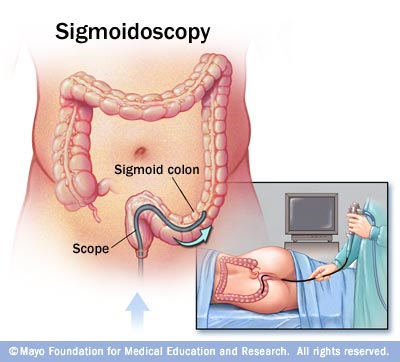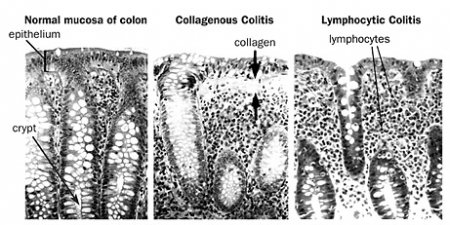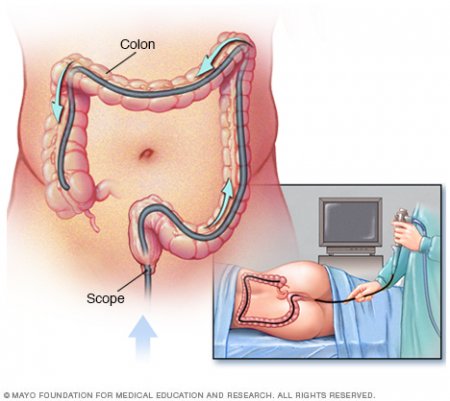Microscopic colitis
- Category: Gastroenterology
- Views: 43815

Microscopic colitis is an inflammation of the large intestine (colon) that causes persistent watery diarrhea. The disorder gets its name from the fact that it's necessary to examine colon tissue under a microscope to identify it, since the tissue may appear normal with colonoscopy or flexible sigmoidoscopy.
There are two subtypes of microscopic colitis:
- Collagenous colitis, in which a thick layer of protein (collagen) develops in colon tissue
- Lymphocytic colitis, in which white blood cells (lymphocytes) increase in colon tissue
Researchers believe collagenous (kuh-LAYJ-uh-nus) colitis and lymphocytic colitis may be different phases of the same condition. Symptoms, testing and treatment are the same for both subtypes.
The symptoms of microscopic colitis can come and go frequently. Sometimes the symptoms resolve on their own. If not, your doctor can suggest a number of effective medications.
Symptoms and causes of the microscopic colitis
Symptoms
Signs and symptoms of microscopic colitis include:
- Chronic watery diarrhea
- Abdominal pain or cramps
- Weight loss
- Nausea
- Fecal incontinence
When to see a doctor
If you have watery diarrhea that lasts more than a few days, contact your doctor so that your condition can be diagnosed and properly treated.
Causes
It's not clear what causes the inflammation of the colon found in microscopic colitis. Researchers believe that the causes may include:
- Medications that can irritate the lining of the colon.
- Bacteria that produce toxins that irritate the lining of the colon.
- Viruses that trigger inflammation.
- Autoimmune disease associated with microscopic colitis, such as rheumatoid arthritis or celiac disease. Autoimmune disease occurs when your body's immune system attacks healthy tissues.
- Bile acid not being properly absorbed and irritating the lining of the colon.
Risk factors
Risk factors for microscopic colitis include:
- Age and gender. Microscopic colitis is most common in people ages 50 to 70 and more common in women than men. Some researchers suggest an association with a decrease in hormones in women after menopause.
- Autoimmune disease. People with microscopic colitis sometimes also have an autoimmune disorder, such as celiac disease, thyroid disease, rheumatoid arthritis, type 1 diabetes or psoriasis.
- Genetic link. Research suggests that there may be a connection between microscopic colitis and a family history of irritable bowel syndrome.
- Smoking. Recent research studies have shown an association between tobacco smoking and microscopic colitis, especially in people ages 16 to 44.
Some research studies indicate that using certain medications may increase your risk of microscopic colitis. But not all studies agree. Medications that may be linked to the condition include:
- Aspirin, acetaminophen (Tylenol, others) and ibuprofen (Advil, Motrin IB, others)
- Proton pump inhibitors including lansoprazole (Prevacid), esomeprazole (Nexium), pantoprazole (Protonix), rabeprazole (Aciphex), omeprazole (Prilosec) and dexlansoprazole (Dexilant)
- Acarbose (Precose)
- Flutamide
- Ranitidine (Zantac)
- Selective serotonin reuptake inhibitors (SSRIs) such as sertraline (Zoloft)
- Carbamazepine (Carbatrol, Tegretol)
- Clozapine (Clozaril, Fazaclo)
- Entacapone (Comtan)
- Paroxetine (Paxil, Pexeva)
- Simvastatin (Zocor)
Diagnosis of the microscopic colitis
A complete medical history and physical examination can help determine whether other conditions, such as celiac disease, may be contributing to your diarrhea.
Your doctor will also ask about any medications you are taking, particularly aspirin and ibuprofen (Advil, Motrin IB, others), which may increase your risk of microscopic colitis.
A definite diagnosis of microscopic colitis requires a colon tissue sample (biopsy) obtained during a colonoscopy or flexible sigmoidoscopy. Both these tests use a long, thin tube with a camera on the end and an attached tissue-sampling device to examine the inside of your colon and remove a sample of tissue. In both subtypes of microscopic colitis, cells in colon tissue have a distinct appearance under the microscope, so the diagnosis is definite.


